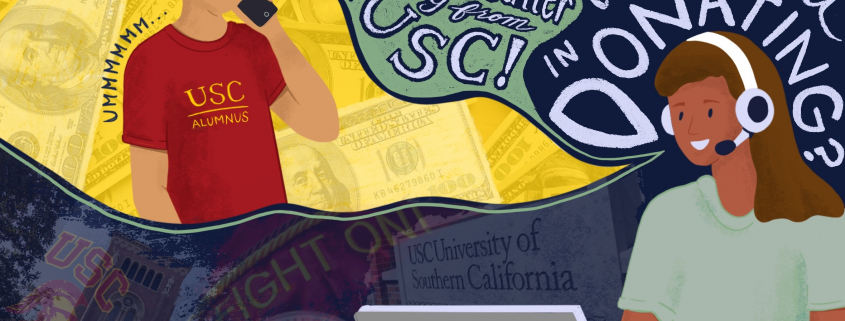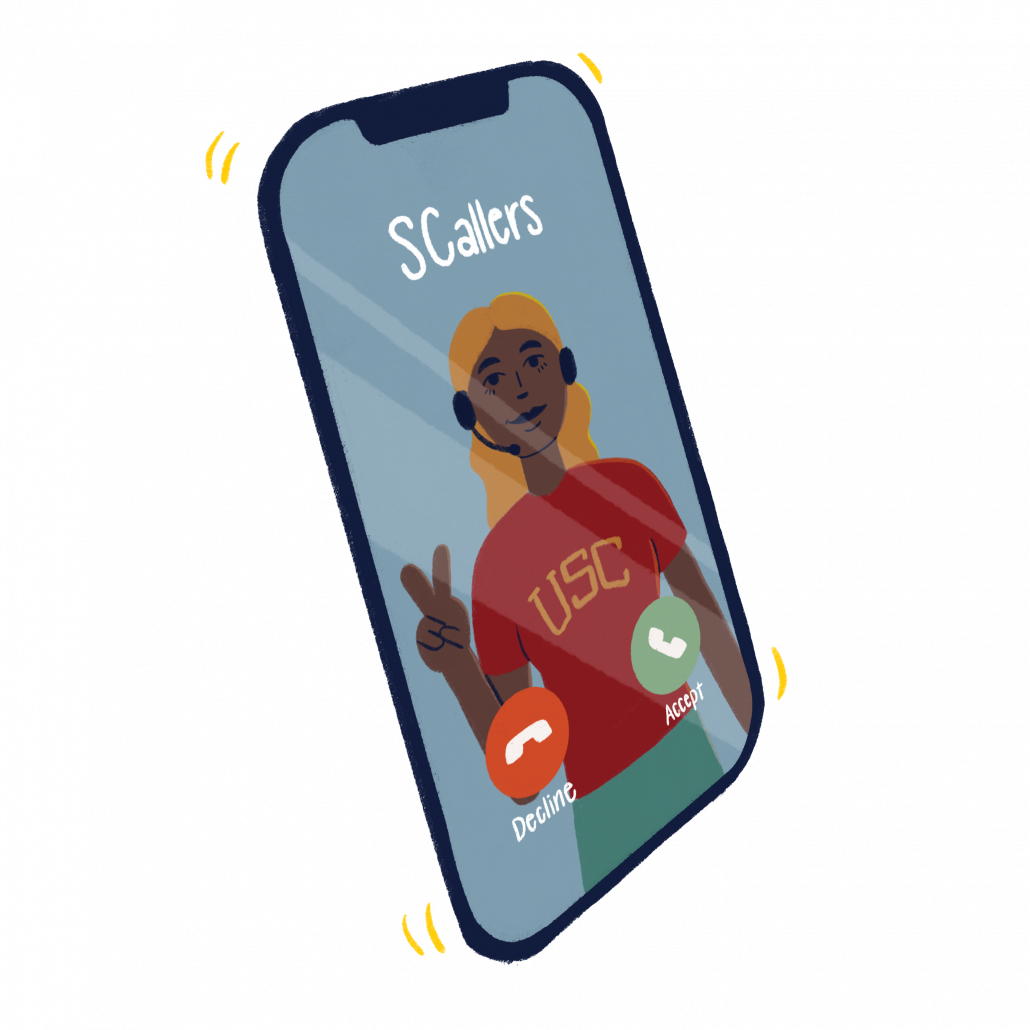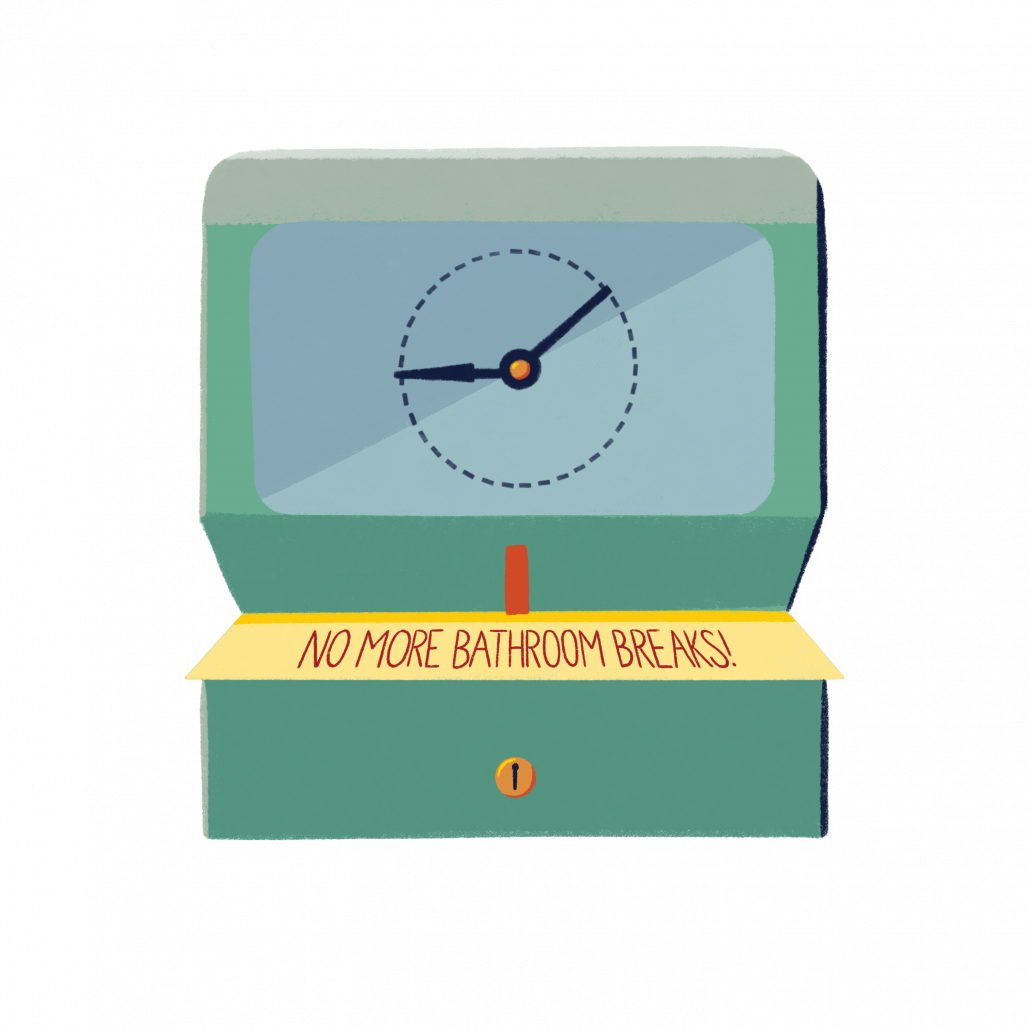Student workers raising funds for USC describe a ‘culture of fear and intimidation’
In a windowless room on South Grand Avenue, dozens of phone lines came abuzz every night as student workers chatted up USC alumni, hoping to get a donation by the end of each call.
This off-campus facility was home to “SCallers,” a cohort of student workers who raised money for USC through phone conversations with alumni. They called former Trojans and shared news of facility upgrades, new programs for research and positive personal anecdotes about USC, aiming to convince clients to open up their purses to their alma mater. SCallers followed a script that asked them to “smile while you dial,” and required they ask each client four separate times for money before hanging up. This number was later lowered to three on account of a recent spate of University scandals, said Alice Thomas, a former USC student and supervisor.
The call center closed in May 2020 after a few scandals of its own, including a controversy over employees’ paid sick leave and a bathroom break policy that penalized workers who used the restroom for too long. But in reflecting on the history of SCallers, some former employees also value the friendships and skills that emerged from their work experience amid these drawbacks. The Daily Trojan interviewed seven former employees who worked at the call center between 2015 and 2020.
“I think getting people to part with their hard earned money is definitely hard to do, especially when you’re embroiled in so many scandals. There were plenty of moments when people were pissed off that you were calling asking for money, but I feel like the positive interactions outweighed those.”
Ethan Ward, former SCaller and 2021 USC alum.
Despite the monotonous nature of scripted phone calls, Ward looked forward to work. He fondly remembers building rapport with clients and developing the courage to make multiple requests during his time at the call center. The job was a fun challenge to his persuasive skills.
“My favorites were the people who answered the phone saying ‘I’m not going to give any money today,’” Ward said. “Then they would give money by the time we got off the phone.”
Ward made connections not only with donors but also with his co-workers. He met supervisors Mariah Breit and Thomas while working in the call center, and the three enjoyed lasting friendships with their fellow SCallers, many of whom were USC students. The managers would sometimes order pizza for the SCallers, organize Christmas gift exchanges and facilitate team-building activities.
“The fun part was the conversations that we had amongst each other,” Ward said. “Being able to build friendships, leaving there, and then going to hang out afterwards. A lot of my good friends now — I met them there.”
But on the phone lines, the conversations were sometimes less friendly, Thomas said.
“You get a lot of rude people, a lot of upset people, a lot of racist people sometimes,” she said.
Thomas recalled one Chinese American SCaller who quit after her first week because a client complained that there were too many Asian students attending the University compared to when he had graduated.
“I was very, very surprised that, even at that time, USC wanted to continue with the call center,” said a former manager, who asked to remain anonymous in the interest of job security. “I think it actually took a toll on the students themselves because we can train them on how to combat or rebut … the complaints. But, still, that’s a lot of emotional and mental abuse they all have to deal with.”
The former manager — though not a USC student — was part of a staff hired by Ruffalo Noel Levitz, an institutional fundraising contractor that oversees call centers at more than 1,900 universities and non-profit organizations around the world. USC’s call center was one of the biggest money-makers for RNL, she said.
But for years the money raised for USC by RNL belied an opaque management style which penalized SCallers for bathroom breaks and misled them about their right to paid sick leave, Thomas said.
Thomas began working at USC’s call center in 2015, where she described a strict workplace rule under which only one employee was permitted to use the restroom at any given time. SCallers were also prohibited from using the restroom during their first and last 30 minutes of shift, she said.
“Turns out, it is illegal to tell someone that they can’t go to the bathroom,” she said.
One employee defied this rule and was told by the manager on duty to sit back down in her seat, an incident which escalated as the employee threw punches and threw a water bottle at her superior. She then knocked over several computers and fled the scene, Thomas said.
California Labor Code states that employees are entitled to a “reasonable” amount of bathroom breaks of “reasonable” duration. Though the definition of a reasonable restroom break can vary between workplaces, employers are prohibited from limiting restroom breaks to certain times during an employee’s shift, according to the law.
Jenna Hanson, another RNL employee, took over as the call center director in May 2016 following this incident. Hanson presided over a new policy, which entailed a seven minute limit on restroom breaks, after which employees would have their pay docked for a 15 minute portion of their shift.
“We had to time how long people were in the bathroom. The supervisors were all USC students, so we didn’t enforce it super strictly.”
Mariah Breit, former SCaller supervisor and USC alum
A former call center manager confirmed that she and her RNL colleagues told Breit and other student supervisors to enforce limits on SCallers’ bathroom breaks.
“I know a few people who got fired for using the bathroom too many times,” Thomas said. “But, on official paperwork, it says it’s because they were inefficient or they weren’t dialing for as many hours as they should have. But it’s because they were in the bathroom.”
One of these employees was Gabbi Soong, who worked at the call center for a few months in 2019 before graduating from USC in 2021. Breit and other supervisors reprimanded Soong for lengthy restroom breaks despite co-workers vouching for her presence at her desk, she said.
“Supervisors would come up to my desk and say, ‘Hey, you were in the bathroom for way too long,’” Soong said. “And I would say, ‘I was sitting here. I wasn’t in the bathroom.’”
Soong was written up twice for these alleged bathroom breaks, the second of which led to her termination. Three write-ups are grounds for dismissal from the call center; Soong had accrued one additional write-up unrelated to bathroom breaks. She was not informed of the final write-up until a manager called her into a meeting to fire her, Soong said.
Official RNL paperwork obtained by the Daily Trojan cited “constant interruptions with calling,” as the reason for Soong’s dismissal. These interruptions constituted a “violation of department work rule,” according to a termination document provided by Soong.
At the time of her dismissal, Soong did not know that she was entitled to paid sick leave.
When asked about sick hours, Hanson initially told SCallers they did not receive sick hours because they were part-time workers, Breit said. After hearing this, Thomas and Breit said they became suspicious of the policy because many of them received paid sick leave at previous or concurrent jobs.
According to California Labor Law section 246, employers must provide employees with written notice that sets forth the amount of paid sick leave available to them.
Upon further investigation, Thomas found she had accrued 90 hours of sick time in her four years working at SCallers. A typical call center employee worked for 10 hours every week. These hours did not appear on her pay stubs, Thomas said.
The two supervisors met with Hanson again, who told Breit and Thomas that she knew little about the call center’s official sick leave policy. Hanson promised to resolve the issue but told the supervisors not to mention paid sick leave to the other SCallers until she made a decision, Breit said.
“I literally had a sleepless night over it,” Thomas said. “I was super anxious because I had been totally manipulated.”
Breit and Thomas decided to tell their co-workers anyway.
Hanson noted to employees that sick leave policies were outlined in a nondescript labor rights flyer posted on the back wall of the call center. If SCallers wanted to be paid for their sick hours, they had to contact RNL management to claim them.
“Hours missed due to being sick should still be made up,” Hanson wrote in an email to the SCallers.
Shifts missed due to illness had to be completed within a week and within the same calendar month and failure to do so would merit a write-up, according to Hanson’s email. This policy constitutes disciplinary action against employees for using sick leave, a practice prohibited by California Labor Law Section 246.
“I was like, ‘That still does not seem right,’” Breit said. “If someone can only work 10 hours a week, and they’re sick, that’s really not their fault.”
The Daily Trojan reached out to Hanson on three separate occasions to make clear the allegations that she had misled call center employees about sick hours. She declined to comment for the story.
The call center amended its sick leave policy in April 2020 in response to months of employee pushback. However, RNL Vice President of Client Success Brian Cass maintained that the policy of asking employees to make up their sick leave was an “acceptable practice,” according to an email obtained by the Daily Trojan that he sent to a student worker.
“I’m sorry you were not aware that as an employee in California you accrued sick time,” Cass wrote in the email. “[I] encourage you to take advantage of this moving forward when you aren’t feeling well.”
As of April 20, 2020, employees utilizing sick hours were no longer required to make up shifts, according to Cass’ email. But there were few opportunities to redeem sick hours after this clarification — the call center officially closed less than a month later.
Cass, who is no longer employed at RNL, declined to comment on how he managed the controversy over paid leave for SCallers.
The paid leave controversies stoked distrust between management and students, Thomas said.
“At the end of the day, what they cared about more than anything was their bottom line and how much money we were making. If we were able to call out sick, that would really affect their numbers, because we wouldn’t have to come in and make that time up.”
Alice Thomas, former SCaller supervisor and USC alum
When the pandemic hit, sick hours were not the only concern on the SCallers’ minds. At the time, Breit worked a second job at the Troy Hall customer service center, where she received paid administrative leave from the University through May 13 according to her regularly scheduled hours.
But for the SCallers it was a different story. Since RNL managed the call center, its employees were not subject to USC’s paid leave policy for student workers. Hanson asked employees to continue working remotely in an email to the SCallers. Their new task: design a marketing plan for the University and record a video including a personal account of the value of a USC education.
Breit was frustrated with the request to create promotional marketing plans for USC while she struggled to adjust to remote learning from her home in Wisconsin, she said.
“It was a lot of work for $15 an hour, especially when she said that she needed it in a week or two,” Breit said. “One of the other students said, ‘This is a job that you could get paid $60,000 [annually] for.’ And so we said, ‘Unless you guys are giving us a raise, we’re not doing this.’”
The SCallers began to receive paid administrative leave April 9, according to an email from Hanson to the staff. Their pay stopped coming in the week of May 13, when the call center officially closed.
As of May 13, 2020, RNL no longer manages USC’s call center, according to an email sent by Cass to the SCallers. When reached for comment about the SCallers, RNL Vice President of Content and Marketing Brandon Trissler did not address the controversy surrounding paid leave or bathroom breaks.
“RNL values our partnership with USC,” he said in an email to the Daily Trojan. “While we do provide the RNL Engage fundraising platform that USC uses for phone channel outreach, we do not employ or manage the USC student call center staff.”
In the future, USC will manage its own call center, according to a University statement. It remains unclear when this call center will begin hiring.
In the statement, USC recognized the SCallers for their work but did not clarify why the call center had closed.
“Student outreach to alumni and donors plays an important role in annual giving because it provides a great personal connection with current students and alumni,” the statement said.
Despite this personal connection, some former student workers still feel undervalued. Ward noted that the lasting friendships he made with his co-workers far outweighed the unpleasant talks with alumni and management. However, the closure of the call center still left a bad taste in his mouth, he said.
“It was a real reality check about how corporations view employees, even if they foster this sense of community like we’re a team.” Ward said.
Thomas echoed this sentiment in regard to her stint as a student worker. She said many of her fellow employees were new to the workforce and unsure of how to advocate for themselves.
“I think that it’s really easy to manipulate college students and people who haven’t worked before,” she said. “We didn’t really know what we were entitled to. And we constantly were being told that we could be replaced. So there was a real culture of fear and intimidation.”
Alice Thomas, former SCaller supervisor and USC alum
As a recent Class of 2021 graduate, Thomas is grateful for the lessons she learned at the call center, she said. After five years of working the phone lines, she remains hopeful for future SCallers who will take her place.
“We were college students; we just wanted to make a buck so we could go out on the weekends,” Thomas said. “I hope that if USC does decide to open up their [own] call center, they’ll make it a lot better for students.”





